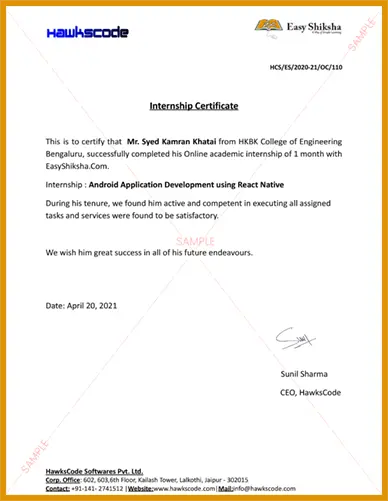In the rapidly evolving field of medical science, continuous learning is essential for professionals seeking to enhance their expertise and stay ahead of the curve. Whether you are a medical student, healthcare professional, or researcher, specialized training programs can significantly elevate your knowledge and skills. EasyShiksha.com offers a wealth of resources to help you find the right programs. Here, we outline ten essential training programs that can take your medical science expertise to the next level.
Top Courses in Medical and Science

Internship/Training with universally recognized certificates accepted by all Universities and Industries
Join over 1,00,000 students from 300+ universities who have already completed internships with EasyShiksha and are now employed at leading MNCs.
"Unlock Your Potential, Forge Your Path"
Explore More1. Advanced Clinical Research Training
Clinical research is the backbone of medical advancements. Advanced Clinical Research Training equips professionals with the skills needed to design, conduct, and analyze clinical trials. This program covers research methodologies, ethical considerations, and regulatory compliance, making it ideal for those aiming to lead or participate in groundbreaking studies.
Benefits: Participants learn about regulatory requirements, ethical considerations, and data management, making it ideal for aspiring clinical researchers and coordinators.
2. Medical Biotechnology Certification
Medical Biotechnology integrates technology with medicine to improve health outcomes. This certification program focuses on areas such as genetic engineering, bioinformatics, and molecular biology. It’s perfect for professionals interested in harnessing biotechnological innovations for medical applications.
Benefits: It provides the technical knowledge required to work on cutting-edge biotechnology projects and innovations.
3. Health Informatics and Data Management
Health Informatics involves managing and analyzing health data to improve patient care and operational efficiency. This program covers electronic health records (EHRs), data security, and health information systems. It’s essential for those looking to work in or lead healthcare IT projects.
Benefits: Proficiency in health informatics is critical for enhancing data-driven decision-making and improving healthcare delivery.
4. Molecular Diagnostics Training
Molecular diagnostics focuses on analyzing biological markers to diagnose diseases. This training program covers techniques such as PCR, sequencing, and microarray analysis. It’s ideal for professionals involved in diagnostics and personalized medicine.
Benefits: Expertise in molecular diagnostics is key for accurate disease detection and tailoring patient-specific treatments.
5. Advanced Pharmacology Certification
Advanced Pharmacology Certification delves into drug mechanisms, interactions, and therapeutic uses. This program is designed for those who need an in-depth understanding of pharmacology to support clinical practice or research.
Benefits: It’s crucial for ensuring safe and effective medication management and contributing to drug development processes.
6. Genomics and Precision Medicine
Genomics and Precision Medicine focuses on using genetic information to tailor medical treatments. This program covers genome sequencing, bioinformatics, and personalized medicine strategies. It’s ideal for professionals aiming to integrate genomics into clinical practice.
Benefits: Genomics is transforming personalized medicine, making it vital for advancing precision healthcare.
7. Clinical Trials Management
Clinical Trials Management involves overseeing the planning, implementation, and monitoring of clinical trials. This training provides skills in project management, regulatory compliance, and trial design. It’s suited for those looking to manage or coordinate clinical research projects.
Benefits: Effective management of clinical trials is essential for ensuring the success and integrity of research studies.
8. Medical Imaging and Radiology
Medical Imaging and Radiology training focuses on diagnostic imaging techniques such as MRI, CT scans, and ultrasound. This program is designed for professionals involved in imaging diagnostics and analysis.
Benefits: Mastery of imaging techniques is critical for accurate diagnosis and treatment planning.
9. Public Health and Epidemiology
Public Health and Epidemiology training addresses the study of disease patterns and public health strategies. This program covers epidemiological methods, disease prevention, and health policy. It’s ideal for those aiming to work in public health research or policy development.
Benefits: Understanding epidemiology is crucial for developing strategies to combat public health issues and improving population health.
10. Biomedical Research Techniques
Biomedical Research Techniques training covers methodologies used in biomedical research, including laboratory techniques, data analysis, and research ethics. This program is essential for researchers aiming to enhance their experimental skills and knowledge.
Benefits: Proficiency in research techniques is fundamental for conducting high-quality biomedical research and contributing to scientific advancements.
How to Choose the Right Program
When selecting a training program, consider your career goals, current skill set, and areas of interest. Research each program thoroughly to understand its curriculum, duration, and format. EasyShiksha.com provides comprehensive information to help you make informed choices about your professional development.
Insights from Internship Students: Testimonials







FAQs:- Frequently Asked Questions
Q1. What are the benefits of enrolling in these training programs?
These programs provide specialized knowledge and skills, enhancing your expertise and career prospects in medical science. They also help you stay current with advancements and innovations in the field.
Q2. How do I choose the right program for my career goals?
Consider your career objectives and current skills. For example, if you’re interested in diagnostics, molecular diagnostics training might be suitable. For management roles, Clinical Trials Management would be beneficial.
Q3. Are these programs suitable for beginners?
Some programs require prior knowledge or experience, while others are designed for various skill levels. Review the program prerequisites to ensure it aligns with your background and goals.
Q4. How long does it take to complete these programs?
Completion times vary by program, ranging from a few weeks to several months. Check the specific duration of each program to plan accordingly.
Q5. Are these certifications recognized globally?
Yes, many of these certifications are recognized internationally and can enhance your qualifications and career prospects globally.
Also Read: MAHE to host 5th National Conference on Youth in Social Change
Get courses: Healthy Lifestyle courses
Conclusion
Investing in specialized training programs is a strategic way to elevate your expertise in medical science and advance your career. The ten programs highlighted here cover a broad spectrum of essential areas, from clinical research and biotechnology to health informatics and genomics. By pursuing these certifications, you can stay at the cutting edge of medical advancements and contribute significantly to your field.
EasyShiksha.com offers a range of resources and courses to support your professional development in medical science. Explore these opportunities to enhance your skills and make a meaningful impact in your career.




































































